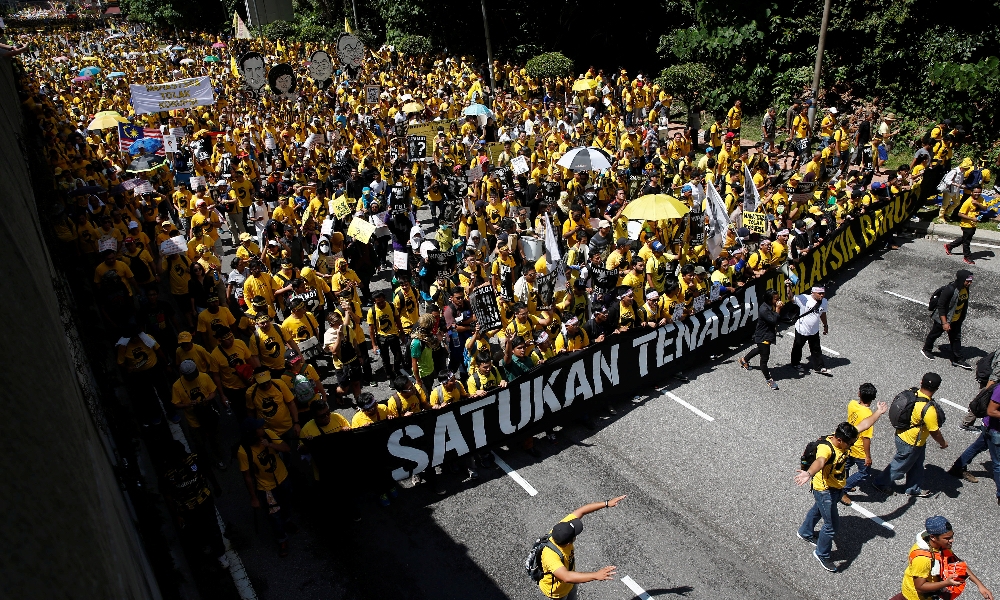Towards the Endgame for Malaysia’s Najib

(The News Lens) – It may be in Malaysia, as in Syria, that despite all the wrongdoings of the leaders, the lack of a unified opposition ensures the continuation of an unpopular incumbent.
Why you need to know
‘If there is an indictment in the DoJ case in the United States where Najib is named directly, then he is toast.’
In July 2012, the venerable weekly magazine The Economist offered that the Syrian Civil War, which had started 15 months earlier, was turning against the Assad regime and the world needed to start preparing for “the day when Syria is at last rid of him.”
In Malaysia, opposition groups hope the revelation of a fresh corruption allegation involving Prime Minister Najib Razak – potentially dwarfing the multi-billion dollar 1MDB scandal – is the beginning of the end for the maligned Malaysian leader.
“People are playing up his chances, but in Malaysia the situation is beginning to slide because he has governed it so badly,” Malaysia-focused investigative journalist Clare Rewcastle Brown says.
The corruption scandal currently unfolding involves FELDA Global Ventures, an enterprise that was listed in 2012, but which the Rewcastle Brown has described as “1MDB Times Ten.”
Rewcastle Brown is a longtime critic of Malaysia’s government and the founder of Sarawak Report, an online publication which led the charge in exposing the multi-billion dollar 1MBD case – it is alleged more than US$1 billion was siphoned from the state investment fund 1MDB into accounts controlled by Najib; the prime minister denies the accusation.
Corruption in Malaysia, the journalist told The News Lens from London, has “exploded” since Najib was voted into power in 2009; the problem “is far wider than just 1MDB.”
If the accusation true, it may be globally significant. But will it be enough to unseat Najib?
‘The information is relentless’
Transactions linked to 1MDB have led to money laundering investigations in a handful of countries, including the U.S., Switzerland, Australia and Singapore. Leading news organizations, including The Wall Street Journal and Bloomberg have dedicated webpages to chronicle each step of the controversy as it unravels.
The Swiss Financial Market Supervisory Authority said in February that it had conducted investigations into “a number of Swiss banks” in relation to the 1MDB and launched proceedings against at least six banks, including Coutts & Co, BSI Bank and Falcon Private Bank AG. In the case of Coutts & Co, the regulator was also considering legal action against the bank employees responsible. Earlier in 2017, Australian Federal Police confirmed they were working alongside international agencies to investigate businesses in Australia linked to 1MBD. Court documents in New Zealand have revealed family members of Jho Low, one of Najib’s cronies, are connected to trusts holding some US$265 million in assets.
In the U.S., the scandal has embroiled Hollywood blockbuster “The Wolf of Wall Street,” as well as banking giant Goldman Sachs and a major New York property developer.
The most notable of the global investigations is the U.S. Department of Justice’s (DoJ) bid to recover more than US$1 billion related to 1MDB – the largest single action ever brought under the Kleptocracy Asset Recovery Initiative. In announcing the action in July 2016, Attorney General Loretta E. Lynch said, “We are seeking to forfeit and recover funds that were intended to grow the Malaysian economy and support the Malaysian people. Instead, they were stolen, laundered through American financial institutions and used to enrich a few officials and their associates. Corrupt officials around the world should make no mistake that we will be relentless in our efforts to deny them the proceeds of their crimes. ”
Rewcastle Brown has been covering corruption in Malaysia for more than seven years; initially she focused on environmental degradation and dodgy business deals in Sarawak, Malaysian Borneo. While she is no longer allowed to travel to Malaysia, and officials in Kuala Lumpur have blocked Sarawak Report from being viewed locally, she is confident reporters in Malaysia and around the world are now focused on uncovering the truth about Najib’s ties to 1MDB.
“The genie is out of the bottle with this story,” she says. “Everybody knows.”
Notwithstanding that Najib has “intimidated a number of people” and some sources have not been adequately protected by the local press – which has served to silence other would-be sources and whistle-blowers – Rewcastle Brown does not foresee a slowdown in the pace of fresh revelations linking Najib and his cronies to corruption.
“The information is relentless,” she says.

Photo Credit:Reuters/達志影像
Forcing a resignation
Professor James Chin is the inaugural Director of the Asia Institute Tasmania, University of Tasmania and a frequent commentator on politics in Southeast Asia.
Asked whether the 1MDB scandal could force Najib to resign, he suggests a lot will depend on the court cases in overseas jurisdictions.
“If there is an indictment in the DoJ case [in the United States] where Najib is named directly, then he is ‘toast,’” Chin says.
Still, Chin does not see this as likely, because of the case’s complexity and the lengthy timeframes involved in the proceedings.
“As long as he is not named directly, he can survive. All he needs to do is the play the game – ‘I am not indicted,’ ‘I am innocent until proven guilty.’”
Saleena Saleem is an Associate Research Fellow with the Malaysia Programme at the S. Rajaratnam School of International Studies (RSIS), Nanyang Technological University, Singapore.
Saleem suggests two possible scenarios where Najib could be forced to resign: new revelations regarding the 1MDB scandal that directly implicates him with wrong-doing; or, new evidence emerges that contradicts his explanations given so far.
“If either of these scenarios occurs just prior to the general elections, which must be called by August 2018, we could potentially see UMNO (Najib’s party) withdraw their support for Najib,” she says.

